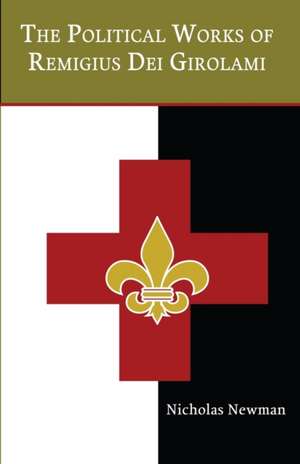The Political Works of Remigius Dei Girolami
Autor Nicholas Newmanen Limba Engleză Paperback – 13 oct 2018
| Toate formatele și edițiile | Preț | Express |
|---|---|---|
| Paperback (1) | 74.97 lei 3-5 săpt. | |
| Saint Dominic's Media Inc. – 13 oct 2018 | 74.97 lei 3-5 săpt. | |
| Hardback (1) | 127.83 lei 3-5 săpt. | |
| Saint Dominic's Media Inc. – 12 oct 2018 | 127.83 lei 3-5 săpt. |
Preț: 74.97 lei
Nou
Puncte Express: 112
Preț estimativ în valută:
14.34€ • 14.98$ • 11.85£
14.34€ • 14.98$ • 11.85£
Carte disponibilă
Livrare economică 25 martie-08 aprilie
Preluare comenzi: 021 569.72.76
Specificații
ISBN-13: 9781732178458
ISBN-10: 1732178453
Pagini: 232
Dimensiuni: 140 x 216 x 13 mm
Greutate: 0.3 kg
Editura: Saint Dominic's Media Inc.
ISBN-10: 1732178453
Pagini: 232
Dimensiuni: 140 x 216 x 13 mm
Greutate: 0.3 kg
Editura: Saint Dominic's Media Inc.
Notă biografică
After completing his undergraduate work in Ancient Greek and Classics at the University of New Hampshire, Nicholas Newman did his graduate work in Ancient Greek, Latin and Medieval History at the University of Zurich, Switzerland, completing his dissertation in 2014. Since finishing his doctoral work, he has been teaching Latin, Greek and Humanities at Kearsarge Regional High School and Northeast Catholic College in New Hampshire.
